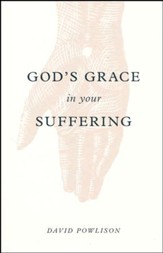Quotes about Suffering-Response_our
The light of Christ in His children is made more manifest to the world through the dark colors of suffering, borne through patient endurance.
Despite the obvious emphasis of Scripture (in regard to suffering), we are bombarded by suggestions that the “successful” Christian living takes place in the realm of constant victory, health, wholeness, and financial prosperity. In response to this we are not to pretend that suffering doesn’t exist or that it might be instantly cured. Such notions are the product of empty heads and closed Bibles.
Made For His Pleasure, Moody Press, 1996, p. 107. Get this book!
If we are devoid of a theology of suffering, we are in danger of marginalizing our expectations of heaven… If we conclude that we are now to experience total healing, unfettered joy, unparalleled success, and freedom from pain, then why be concerned about heaven? How did Paul handle his sufferings and encourage the church to face theirs? Not by trying to produce heaven on earth but by recognizing that for the Christian the best is yet to be. He took the moment and put it in the larger context of God’s unfolding purpose, not only for time but also in eternity (2 Corinthians 4:16-18).
Made For His Pleasure, Moody Press, 1996, p. 116. Get this book!
Let the people of God comfort themselves in all cases by this doctrine of the divine decrees; and, amidst whatever befalls them, rest quietly and submissively in the bosom of God, considering that whatever comes or can come to pass, proceeds from the decree of their gracious friend and reconciled Father, who knows what is best for them, and will make all things work together for their good. O what a sweet and pleasant life would ye have under the heaviest pressures of affliction, and what heavenly serenity and tranquility of mind would you enjoy, would you cheerfully acquiesce in the good will and pleasure of God, and embrace every dispensation, how sharp soever it may be, because it is determined and appointed for you by the eternal counsel of His will!
God never pursues His glory at the expense of the good of His people, nor does He ever seek our good at the expense of His glory. He has designed His eternal purpose so that His glory and our good are inextricably bound together. What comfort and encouragement this should be to us. If we are going to learn to trust God in adversity, we must believe that just as certainly as God will allow nothing to subvert His glory, so He will allow nothing to spoil the good He is working out in us and for us.
Trusting God, 1988, p. 25. Used by permission of NavPress – www.navpress.com. All rights reserved. Get this book!
Our first priority in times of adversity is to honor and glorify God by trusting Him. We tend to make our first priority the gaining of relief from our feelings of heartache or disappointment or frustration. This is a natural desire, and God has promised to give us grace sufficient for our trials and peace for our anxieties (2 Corinthians 12:9, Philippians 4:6-7). But just as God’s will is to take precedence over our will (Jesus Himself said, “Yet not as I will, but as you will” – Matthew 26:39), so God’s honor is to take precedence over our feelings. We honor God by choosing to trust Him when we don’t understand what He is doing or why He has allowed some adverse circumstance to occur. As we seek God’s glory, we may be sure that He has purposed our good and that He will not be frustrated in fulfilling that purpose.
Trusting God, 1988, p. 52. Used by permission of NavPress – www.navpress.com, All rights reserved. Get this book!
A gracious soul may look through the darkest cloud and see God smiling on him.
[Paul’s] thrice-repeated prayer for the removal of the ailment was answered, not by his deliverance from it, but by his receiving the necessary grace to bear it – not simply to live with it but to be thankful for it. If his ministry was so effective despite this physical weakness, then the transcendent power was manifestly God’s, not his own. Infirmities like this were welcomed, together with the other hardships…if they were the condition on which the power of the risen Christ operated through him. They constantly reminded him not so much of his own inadequacy as of the total adequacy of Christ, in whom, when he was personally most weak, he knew himself to be most strong.
Paul – Apostle of the Heart Set Free, Eerdmans, 1977, www.eerdmans.com, p. 136. Get this book!
Therefore, I bind these lies and slanderous accusations to my person as an ornament; it belongs to my Christian profession to be vilified, slandered, reproached and reviled, and since all this is nothing but that, as God and my conscience testify, I rejoice in being reproached for Christ’s sake.
Grace Abounding, Evangelical Press, 2000, p. 143. Get this book!
We do not give the subject of evil and suffering the thought it deserves until we ourselves are confronted with tragedy. If by that point our belief – not well thought out but deeply ingrained – are largely out of step with the God who has disclosed Himself in the Bible and supremely in Jesus, then the pain from the personal tragedy may be multiplied many times over as we begin to question the very foundations of our faith.
In the darkest night of the soul, Christians have something to hold onto that Job never knew – we know Christ crucified. Christians have learned that when there seems to be no other evidence of God’s love, they cannot escape the cross. “He who did not spare His own Son but gave Him up for us all – how will He not also, along with Him, graciously give us all things?” (Rom. 8:32)… When we suffer there will sometimes be mystery. Will there also be faith? Yes. If our attention is focused more on the cross and on the God of the cross than on the suffering itself.
Christians do not suffer accidentally or because of the irresistible forces of blind fate; rather, they suffer according to God’s will… Therein lies the knowledge that there is a limit to the suffering, both in its intensity and in its duration, a limit set and maintained by the God who is our creator, our savior, our sustainer, our Father.
Endurance in the midst of suffering, not success, health, or wealth, is the mark of a genuine Christian life. Furthermore, it is faith and hope in the midst of suffering, not miraculous deliverance from it, that display most clearly the all-sufficiency of God to a despairing world.
When Christians suffer, they, like Paul, can consequently take courage from the fact that their lives will mediate to others the power of the Resurrection, either through God’s act of deliverance or, even more profoundly, through the testimony of their endurance. In either case we are summoned to trust God in the midst of our afflictions in the confidence that God will ultimately deliver us. By so doing, God’s power will be manifest in our weakness.
Anybody can worship Santa Claus. But hanging in there with God in the midst of intense suffering, as Christ hung on the cross, magnifies the worth of God as the one who sustains us. God’s goal in suffering, therefore, is to teach us that in life and in death, as in all eternity, He Himself is all we ultimately need.
Don’t bear trouble, use it. Take whatever happens – justice and injustice, pleasure and pain, compliment and criticism – take it up into the purpose of your life and make something out of it. Turn it into testimony. Don’t explain evil, exploit evil; make it serve you. Just as the Lotus flower reaches down and takes up the mud and mire into the purposes of its life and produces the lotus flower out of them, so you are to take whatever happens and make something out of it.
For if [a Christian] cannot thank and praise God as well in calamities and sufferings as in prosperity and happiness, he is as far from the piety of a Christian as he that only loves them that love him is from the charity of a Christian. For to thank God only for such things as you like is no more a proper act of piety than to believe only what you see is an act of faith. Resignation and thanksgiving to God are only acts of piety when they are acts of faith, trust and confidence in the divine goodness.
Suffering in this life is at least partly a warning to us, a foretaste of the eternal suffering we deserve outside of Christ.
The Story of Love by Michael Lawrence taken from Biblical Theology by Michael Lawrence, copyright 2010, Crossway Books, a division of Good News Publishers, Wheaton Illinois 60187, www.crosswaybooks.org. Page 150.
[People] need their best theology in their darkest moments.
Much suffering in the life of the church is a mystery. We must be comfortable with the mystery. We must allow God to have His secrets in our suffering.
Some believers are very surprised when they are called to suffer. They thought they would do some great thing for God, but all God permits them to do is to suffer. Just suppose you could speak with those who have gone to be with the Lord; everyone has a different story, yet everyone has a tale of suffering. One was persecuted by family and friends…another was inflicted with pain and disease, neglected by the world…another was bereaved of children…another had all these afflictions. But you will notice that though the water was deep, they all have reached the other side. Not one of them blames God for the road He led them; “Salvation” is their only cry. Are there any of you, dear children, murmuring at your lot? Do not sin against God. This is the way God leads all His redeemed ones.
God often comforts us, not by changing the circumstances of our lives, but by changing our attitude toward them (S.H.B. Masterman).
We do not choose suffering simply because we are told to, but because the one who tells us to describes it as the path to everlasting joy. He beckons us into the obedience of suffering not to demonstrate the strength of our devotion to duty, nor to reveal the vigor of our moral resolve, nor to prove the heights of our tolerance for pain; but rather to manifest, in childlike faith, the infinite preciousness of his all-satisfying promises. Moses “chose to share ill-treatment with the people of God rather than enjoy the fleeting pleasures of sin…because he looked to the reward” (Hebrews 11:25-26). Therefore his obedience glorified the reward of grace, not the resolve to suffer.
Desiring God, 1996, p. 237-238, Used by Permission, www.desiringGod.org. Get this book!
This is the rock where we stand when the dark clouds gather and the floods lick at our feet: justification is by grace alone (not mixed with our merit), through faith alone (not mixed with our works) on the basis of Christ alone (not mingling his righteousness with ours), to the glory of God alone (not ours).
Faith Alone and the Fight for Joy taken from When the Darkness Will Not Lift by John Piper, 2006, Crossway Books, a division of Good News Publishers, Wheaton Illinois 60187, www.crosswaybooks.org. p. 16.
Paul did not minimize or make light of his sufferings, but he was not embittered by them. Instead, he found contentment in God’s merciful purposes through them.
Why I Love the Apostle Paul, Copyright 2019, John Piper. Used by permission. www.DesiringGod.org. Page 37.
All experiences of suffering in the path of Christian obedience, whether from persecution or sickness or accident, have this in common: They all threaten our faith in the goodness of God and tempt us to leave the path of obedience. Therefore, every triumph of faith and all perseverance in obedience are testimonies to the goodness of God and the preciousness of Christ – whether the enemy is sickness, Satan, sin or sabotage. Therefore, all suffering, of every kind, that we endure in the path of our Christian calling is a suffering "with Christ" and "for Christ." With Him in the sense that the suffering comes to us as we are walking with Him by faith, and in the sense that it is endured in the strength that He supplies through His sympathizing high-priestly ministry (Hebrews 4:15). For Him in the sense that the suffering tests and proves our allegiance to His goodness and power, and in the sense that it reveals His worth as an all-sufficient compensation and prize.
Suffering for the Sake of the Body – The Pursuit of People Through Pain, A Seminar for The Bethlehem Institute.
It is, and should be the care of a Christian, not to suffer for sin, nor sin in suffering.
Powell A Puritan Golden Treasury, compiled by I.D.E. Thomas, by permission of Banner of Truth, Carlisle, PA. 2000, p. 288.
[When suffering] you need to seek help. This help comes first and finally from the living God. He hears, helps, strengthens, and vindicates those who rely on Him. If you look anywhere else first, you will set yourself up for a fall. You will get snared in bitterness and revenge (spurning God for your pride). You will flee in avoidance and addiction (spurning God for your false refuges and comforts). You will develop a perverted dependency on others (spurning God for your trust in man). Sadly, our culture has awakened countless people to think about what evil-doers (“abusers”) have done to them, but it has cast them upon their own resources as “abuse victims.” Yet victims can properly understand their own sins and sufferings, and God’s grace.
Seeing With New Eyes, P&R Publishers, 2003, p. 107. Get this book!
I assure you by the Lord, your adversaries shall get no advantage against you, except you sin, and offend your Lord, in your sufferings.
I earnestly entreat all…believers to remember that they may honor God as much by patient suffering as they can by active work. It often shows more grace to sit still than it does to go to and fro, and perform great exploits.
Just because you come to Christ does not mean you will not experience suffering. Christians and non-Christians suffer with similar trials. The difference is not in the nature of the trial, but rather the way in which we respond to the trials. You see, the world needs things in their life to go well to stay happy. Therefore they are continually up and down based upon their circumstances. Christians however know that God is sovereign over the trials they experience. They know the trials are specifically customized to their lives sent from the wise and loving hands of God. They are not sent to rob us of our joy. They are sent to refine us and make us more like Christ. Therefore it is our responsibility to by God’s grace remain under the trials until they perform in us the work designated by God. Knowing and believing this, we can have deep joy even in the worst of times because we know God’s refining process is the best thing we can ask for for spiritual transformation, Christlikeness.
Jacob is about to enter the Promised Land. He will be one of the venerated Patriarchs of the faith. But before Jacob can become Israel, the man must be broken. Jacob needs to learn that his life is to be one of continual striving with God, but doing it with full dependence on God. He will learn that with God there is a continual heat from the refiner’s fire, but through the adversity there is an unspeakable joy in the journey. And though God probably won’t be wrestling with any of us physically like He did with Jacob, there is a continual tension of finding our greatest peace when we are most intimate in close communion with God. At times we struggle, but in the pain we learn to submit to His will, allow Him to expose our defects, yield to the wounds He creates and then trust Him that the pain is for our greatest good as the “old man” is further put to death. If we act in the flesh and run away or defend ourselves or blame others or whine and complain, we’ll never experience this. As creatures so prone to follow our selfish instincts, there is a serenity that comes when God wrestles us to the ground, breaks us further of our pride and reminds us that our sufficiency is only in Him.
Those in the world do not respond well to pain. They fear it, despise it and run from it. They struggle with why God would allow suffering. They see no purpose in it. They make themselves out to be a victim and with bitter hearts blame the world for their misfortunes. They fret, overreact, whine, and complain. They throw massive pity-parties. They lose peace and joy and move further away from God. On the other hand, Christians know from the Bible and experience that God sovereignly permits suffering to enter our lives. We trust His goodness and wisdom and remain under the trial until it accomplishes God’s designed work in our lives. Since His primary goal is to make us holy, God gets our attention through the trial and then is continually refining our character. We don’t minimize the pain and sorrow, but know deep inside through faith that good will come out of it. We can therefore give thanks for all things and maintain our joy and peace despite apparently unfavorable circumstances. Do you see the diametrically opposed contrast to the world?
Too often Christians deal with the pain like an atheist, as if God were not involved. We don’t take our lives, but we live the rest of our lives as an empty, depressed, defeated soul. We find no pleasure in living. The minimal tasks become burdens. We are of little use to God or others. We mope around with long faces and oftentimes self-medicate ourselves with chemicals, spending addictions and withdrawal from others. I think it goes without saying that this lifestyle shows no faith in God’s good providence, brings Him dishonor and results in a miserable life.
Understand the richer blessings of eternal glory, then remember your temporary suffering in this fallen world is beyond comparison (Rom. 8:18). Eternal hell is the ultimate suffering. For the believer in Christ, your lesser suffering will soon end. It is only “for a little while” (1 Pet. 1:6; 5:10). It’s been said, “For the unbeliever, this present world is as good as it gets. Yet for the believer, this present world is as bad as it gets.”
I wish that saints would cling to Christ half as earnestly as sinners cling to the devil. If we were as willing to suffer for God as some are willing to suffer for their lusts, what perseverance and zeal would be seen on all sides!
Our sorrows are all, like ourselves, mortal. There are no immortal sorrows for immortal souls. They come, but blessed be God, they also go. Like birds of the air, they fly over our heads. But they cannot make their abode in our souls. We suffer today, but we shall rejoice tomorrow.
The real sting of suffering is not misfortune itself, nor even the pain of it or the injustice of it, but the apparent God-forsakenness of it. Pain is endurable, but the seeming indifference of God is not…We think of Him as an armchair spectator, almost gloating over the world’s suffering, and enjoying His own insulation from it. It is this terrible caricature of God that the cross smashes to smithereens.
Taken from Cross of Christ by John Stott. Copyright(c) 1986. Used by permission of InterVarsity Press, PO Box 1400, Downers Grove, IL 60515, p. 329. www.ivpress.com. http://www.ivpress.com/cgi-ivpress/book.pl/code=3320.
Wisdom and comfort are found in knowing and trusting God as He has revealed Himself – even when you can’t understand the reason for your suffering.
Emotion as a result of tragedy is not sin; rejecting God’s sovereignty and responding in anger or impatience is sin. Yes, we accept God’s plan in humble submission, but this doesn’t mean we don’t go before Him to weep and wail.
How we handle suffering is directly related to our view of God. Most professing Christians think they believe in the sovereign power of God, but in reality they don’t act like they believe that God is completely sovereign. They don’t believe God is in control of every single event in their life.
Do not say: “I cannot bear this from such a man, nor should I suffer things of this kind, for he has done me a great wrong. He has accused me of many things of which I never thought. However, from someone else I will gladly suffer as much as I think I should.” Such a thought is foolish, for it does not consider the virtue of patience or the One who will reward it, but rather weighs the person and the offense committed. The man who will suffer only as much as seems good to him, who will accept suffering only from those from whom he is pleased to accept it, is not truly patient.
Many times great difficulties precede special works of God. You can even say that God wins His greatest victories in the midst of apparent defeat. This can be clearly demonstrated in the life of our Lord on earth. When Jesus was crucified and placed in the tomb, it looked like the forces of unrighteousness had triumphed. However, it was in this time of apparent defeat that our victory for our salvation was won. This time of apparent defeat was followed by the resurrection of Christ.
A Journey to Victorious Praying, Moody Publishers, 2003, p. 34.
Get this book!
What then are we to do about our problems? We must learn to live with them until such time as God delivers us from them. We must pray for grace to endure them without murmuring. Problems patiently endured will work for our spiritual perfecting. They harm us only when we resist them or endure them unwillingly
In adversity we usually want God to do a removing job when He wants to do an improving job.
Suffering is God’s surgery that leads to health when we respond by faith.

































